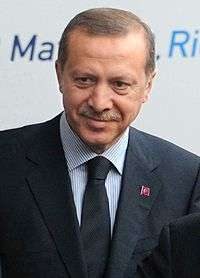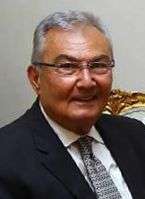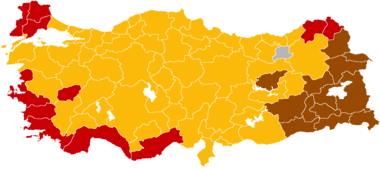Turkish general election, 2002
| | ||||||||||||||||||||||||||||||||||||||||||||||||||||||
| ||||||||||||||||||||||||||||||||||||||||||||||||||||||
| ||||||||||||||||||||||||||||||||||||||||||||||||||||||
|
| ||||||||||||||||||||||||||||||||||||||||||||||||||||||
| Winners according to provinces: AKP CHP DEHAP Independents | ||||||||||||||||||||||||||||||||||||||||||||||||||||||
| ||||||||||||||||||||||||||||||||||||||||||||||||||||||
 |
| This article is part of a series on the politics and government of Turkey |
|
See also
|
The 15th Turkish general election was held on 3 November 2002 following the collapse of the DSP-MHP-ANAP coalition led by Bülent Ecevit. It was the 15th general election to be held in Turkey. All 550 members of the Grand National Assembly were up for election.
The election was held during an ongoing economic crisis which followed the 2001 financial crash, which resulted in a deep resentment of coalition governments which had governed the country since the 1980 military coup. The Justice and Development Party (AKP), which had only been formed in 2001 by Recep Tayyip Erdoğan, won the election with nearly two-thirds of the seats. The protest vote was such that every sitting party previously represented in parliament was ejected, with the AKP winning 363 seats with just 34.3% of the vote. The only other party which passed the 10% threshold to gain representation was the Republican People's Party, which came second with 19.38% of the vote and 178 seats. The election produced Turkey's first single party government since 1987 and the country's first two-party parliament since 1960.
The moderate Islamism advocated by the AKP was at odds with the secular establishment of the Republic of Turkey. While serving as the Mayor of Istanbul, Erdoğan was sentenced to a 10 month prison term in 1998 for reciting a poem in Siirt which incited racial intolerance. This barred him from initially seeking a seat in parliament, meaning that the AKP's co-founder Abdullah Gül became Prime Minister following their election victory. With the help of the CHP, the government overturned Erdoğan's political ban in 2003, after which he was able to seek a seat in a controversial by-election in the Province of Siirt. Erdoğan became Prime Minister in March 2003, with Abdullah Gül concurrently assuming the role of Foreign Minister and Deputy Prime Minister.
Results
Voting ended in the country's 32 eastern provinces at 3pm, having begun an hour earlier in morning, and in the remaining 49 provinces at 4pm. Counting began immediately afterwards.
A press black-out was placed on all results by the electoral authority so that it could ensure all ballot boxes were secure, but even when it became clear that every box in the country had been sealed, the authority refused to sway from its original deadline of 9pm. With early results being already announced by foreign media outlets, Turkish television switched to a live shot of the Electoral Authority headquarters until an announcement was made at 7.30pm revoking the black-out.
Total votes and seats for each party
| Party | Vote | Seats | ||||||||
|---|---|---|---|---|---|---|---|---|---|---|
| Abbreviation | Party name in Turkish |
Leader(s) | Votes | % | swing | Elected | % of total | ± since 2 Nov |
± since 1999 | |
| AKP |
Justice and Development Party Adalet ve Kalkınma Partisi |
10,808,229 | 34.28 | New | 363 | 66.00 | | New | ||
| CHP |
Republican People's Party Cumhuriyet Halk Partisi |
6,113,352 | 19.39 | | 178 | 32.36 | | | ||
DYP |
True Path Party Doğru Yol Partisi |
3,008,942 | 9.54 | |
0 | 0.00 | | | ||
MHP |
Nationalist Movement Party Milliyetçi Hareket Partisi |
2,635,787 | 8.36 | |
0 | 0.00 | | | ||
GP |
Young Party Genç Parti |
2,285,598 | 7.25 | New | 0 | 0.00 | | New | ||
DEHAP |
Democratic People's Party* Demokratik Halk Partisi |
1,960,660 | 6.22 | |
0 | 0.00 | | | ||
ANAP |
Motherland Party Anavatan Partisi |
1,618,465 | 5.13 | |
0 | 0.00 | | | ||
SP |
Felicity Party^ Saadet Partisi |
785,489 | 2.49 | |
0 | 0.00 | | |||
DSP |
Democratic Left Party Demokratik Sol Parti |
384,009 | 1.22 | |
0 | 0.00 | | |||
YTP |
New Turkey Party Yeni Türkiye Partisi |
363,869 | 1.15 | New | 0 | 0.00 | | New | ||
BBP |
Great Union Party Büyük Birlik Partisi |
322,093 | 1.02 | |
0 | 0.00 | | | ||
| Independents Bağımsızlar |
314,251 | 1.00 | |
9 | 1.64 | | ||||
YURT-P |
Homeland Party Yurt Partisi |
294,909 | 0.94 | New | 0 | 0.00 | | New | ||
İP |
Workers' Party İşçi Partisi |
159,843 | 0.51 | |
0 | 0.00 | | |||
BTP |
Independent Turkey Party Bağımsız Türkiye Partisi |
150,482 | 0.48 | New | 0 | 0.00 | | New | ||
ÖDP |
Freedom and Solidarity Party Özgürlük ve Dayanışma Partisi |
106,023 | 0.34 | |
0 | 0.00 | | | ||
LDP |
Liberal Democrat Party Liberal Demokrat Parti |
Besim Tibuk |
89,331 | 0.28 | |
0 | 0.00 | | ||
MP |
Nation Party Millet Partisi |
Aykut Edibali |
68,271 | 0.22 | |
0 | 0.00 | | ||
TKP |
Communist Party of Turkey Türkiye Komünist Partisi |
59,180 | 0.19 | New | 0 | 0.00 | | New | ||
| Total | 31,528,783 | 100.00 | 550 | 100.00 | | |||||
| Valid votes | 31,528,783 | 96.22 | |
|||||||
| Invalid / blank votes | 1,239,378 | 3.78 | | |||||||
| Votes cast / turnout | 32,768,161 | 79.14 | | |||||||
| Abstentions | 8,638,866 | 20.86 | | |||||||
| Registered voters | 41,407,027 | |||||||||
| Source: Supreme Electoral Council of Turkey (full confirmed results) * The Democratic People's Party's result is compared to the People's Democracy Party's result from the 1999 general election ^ The Felicity Party's result is compared to the Virtue Party's result from the 1999 general election | ||||||||||
Effects
New government
Although the AKP's victory was indisputable, Erdoğan's appointment as prime minister was delayed owing to his previous criminal conviction, which prevented him from standing for parliament. Another prominent party member, Abdullah Gül, became prime minister and remained in the position until a constitutional amendment could be pushed through to allow Erdoğan to stand for a freshly vacant seat in a March 2003 by-election.
Party resignations
The result prompted the near-immediate resignations of several prominent figures in Turkish politics:
- Mesut Yılmaz, former prime minister and leader of the Motherland Party (ANAP). He was succeeded by Ali Talip Özdemir
- Tansu Çiller, former prime minister and leader of the True Path Party (DYP). Çiller was succeeded by her former interior minister, Mehmet Ağar.
- Devlet Bahçeli, leader of the Nationalist Movement Party (MHP) and senior coalition partner in the outgoing government. His resignation was not accepted by his party's central committee, and he remained leader.
Outgoing prime minister Bülent Ecevit was widely expected to resign as leader of his Democratic Left party, but did not end up leaving until a party conference in 2004.


